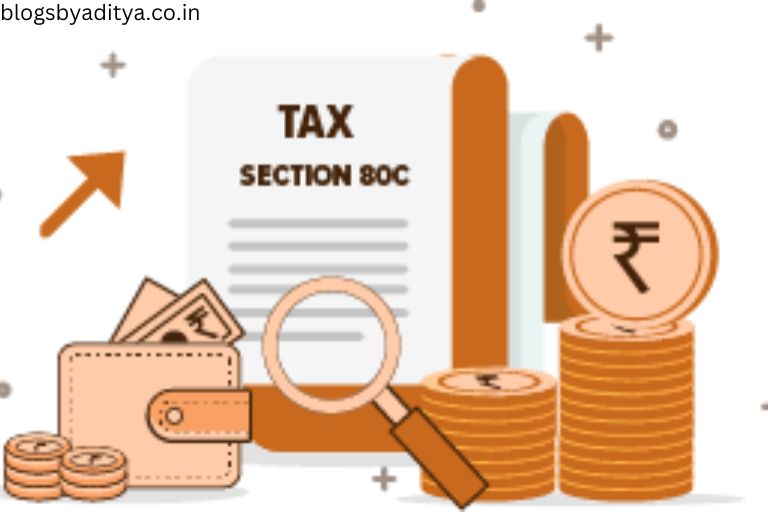
What is Section 80C?
Section 80C of the Income Tax Act, 1961 is a popular section that allows taxpayers to claim deductions from their taxable income. Under this section, taxpayers can claim deductions for investments made in various financial instruments and schemes. The maximum deduction allowed under Section 80C is ₹1.5 lakhs per financial year.
Deductions under Section 80C
There are several financial instruments and schemes that qualify for deductions under Section 80C. Some of the most popular options include:
- Life Insurance Premiums: Premiums paid for life insurance policies, including term insurance, endowment plans, and unit-linked insurance plans (ULIPs), qualify for deductions under Section 80C. However, the deduction is limited to the sum assured under the policy.
- Public Provident Fund (PPF): Contributions made to a PPF account are eligible for deductions under Section 80C. The maximum deduction allowed for PPF contributions is ₹1.5 lakhs per financial year.
- Sukanya Samriddhi Yojana (SSY): Contributions made to an SSY account for a girl child are also eligible for deductions under Section 80C. The maximum deduction allowed for SSY contributions is ₹1.5 lakhs per financial year.
- National Pension Scheme (NPS): Contributions made to an NPS account are eligible for deductions under Section 80C. The maximum deduction allowed for NPS contributions is ₹1.5 lakhs per financial year.
- Tax-Saving Fixed Deposits: Fixed deposits offered by banks and post offices that have a lock-in period of five years or more qualify for deductions under Section 80C.
- Tuition Fees: Tuition fees paid for children’s education are eligible for deductions under Section 80C. However, the deduction is limited to ₹2 lakhs per financial year.
- Home Loan Principal Repayment: The principal portion of home loan repayments is eligible for deductions under Section 80C. However, the deduction is limited to ₹1.5 lakhs per financial year.
- Five-Year Post Office Term Deposits: Five-year post office term deposits qualify for deductions under Section 80C.
Tax-Related Information
- The maximum deduction allowed under Section 80C is ₹1.5 lakhs per financial year.
- Deductions under Section 80C can be claimed by individuals, Hindu Undivided Families (HUFs), and companies.
- The deduction under Section 80C is available for investments made during the financial year.
- The deduction under Section 80C is subject to certain conditions and limitations.
- It is important to consult with a tax expert to ensure that you are claiming the maximum deduction under Section 80C.
Deep Dive into Section 80C Investments
Let’s delve deeper into some of the most popular investments under Section 80C:
1. Public Provident Fund (PPF):
- Safety and Stability: PPF offers a secure and stable investment option with government backing.
- Tax-Free Returns: The interest earned on PPF is exempt from tax.
- Loan Facility: You can avail of a loan against your PPF balance.
2. National Pension Scheme (NPS):
- Retirement Planning: NPS is a retirement savings scheme that provides a regular pension upon retirement.
- Tax Benefits: Contributions to NPS are eligible for deductions under Section 80C.
- Diversification: NPS offers a variety of investment options, allowing you to diversify your portfolio.
3. Sukanya Samriddhi Yojana (SSY):
- For Girl Child: SSY is a government-backed scheme specifically designed for the education and marriage of a girl child.
- Tax Benefits: Contributions to SSY are eligible for deductions under Section 80C.
- Guaranteed Returns: SSY offers a guaranteed rate of interest.
4. Tax-Saving Fixed Deposits:
- Fixed Returns: Tax-saving fixed deposits offer a fixed rate of interest.
- Lock-in Period: These deposits typically have a lock-in period of five years or more.
- Limited Returns: Compared to other investments, fixed deposits may offer lower returns.
5. Life Insurance Premiums:
- Risk Coverage: Life insurance provides financial protection for your family in case of unforeseen events.
- Tax Benefits: Premiums paid for eligible life insurance policies are deductible under Section 80C.
- Investment Component: Some life insurance policies also have an investment component.
6. Tuition Fees:
- Education Expenses: Tuition fees paid for children’s education are eligible for deductions under Section 80C.
- Maximum Deduction: The maximum deduction allowed for tuition fees is ₹2 lakhs per financial year.
7. Home Loan Principal Repayment:
- Real Estate Investment: The principal portion of home loan repayments is deductible under Section 80C.
- Maximum Deduction: The maximum deduction allowed for home loan principal repayment is ₹1.5 lakhs per financial year.
The best investment for you depends on your financial goals, risk tolerance, and time horizon. It’s essential to carefully consider all factors before making a decision.
While the above information provides a comprehensive overview of Section 80C, here are some additional tips to help you maximize your deductions:
1. Plan Ahead:
- Start Early: The earlier you start investing, the more time your investments have to grow.
- Diversify: Consider a mix of investments to spread risk and maximize returns.
2. Consider the Lock-in Period:
- Short-Term vs. Long-Term: Some investments have shorter lock-in periods, while others require a longer commitment. Choose based on your financial goals.
3. Factor in Interest Earned:
- Tax Implications: Interest earned on certain investments may be taxable. Consider the overall tax implications before making a decision.
4. Explore Other Tax-Saving Avenues:
- Section 80D: Deductions for health insurance premiums and medical expenses.
- Section 80E: Deductions for education loan interest.
- Section 80DD: Deductions for expenses incurred for disabled dependents.
5. Consult a Tax Professional:
- Personalized Advice: A tax expert can help you understand your specific situation and recommend the best strategies to maximize your deductions.
6. Be Aware of Changes in Tax Laws:
- Stay Updated: Tax laws can change from year to year. Stay informed about any updates that may affect your deductions.
7. Avoid Last-Minute Rush:
- Plan Ahead: Avoid making hasty decisions at the end of the financial year. Plan your investments well in advance.
Remember: While maximizing your deductions is important, it’s also essential to consider your long-term financial goals. Ensure that your investments align with your overall financial plan.
Section 80C is a valuable tool for reducing your taxable income. By investing in eligible financial instruments and schemes, you can save on taxes and build wealth for the future. It is important to understand the various options available under Section 80C and choose the ones that best suit your financial goals.


